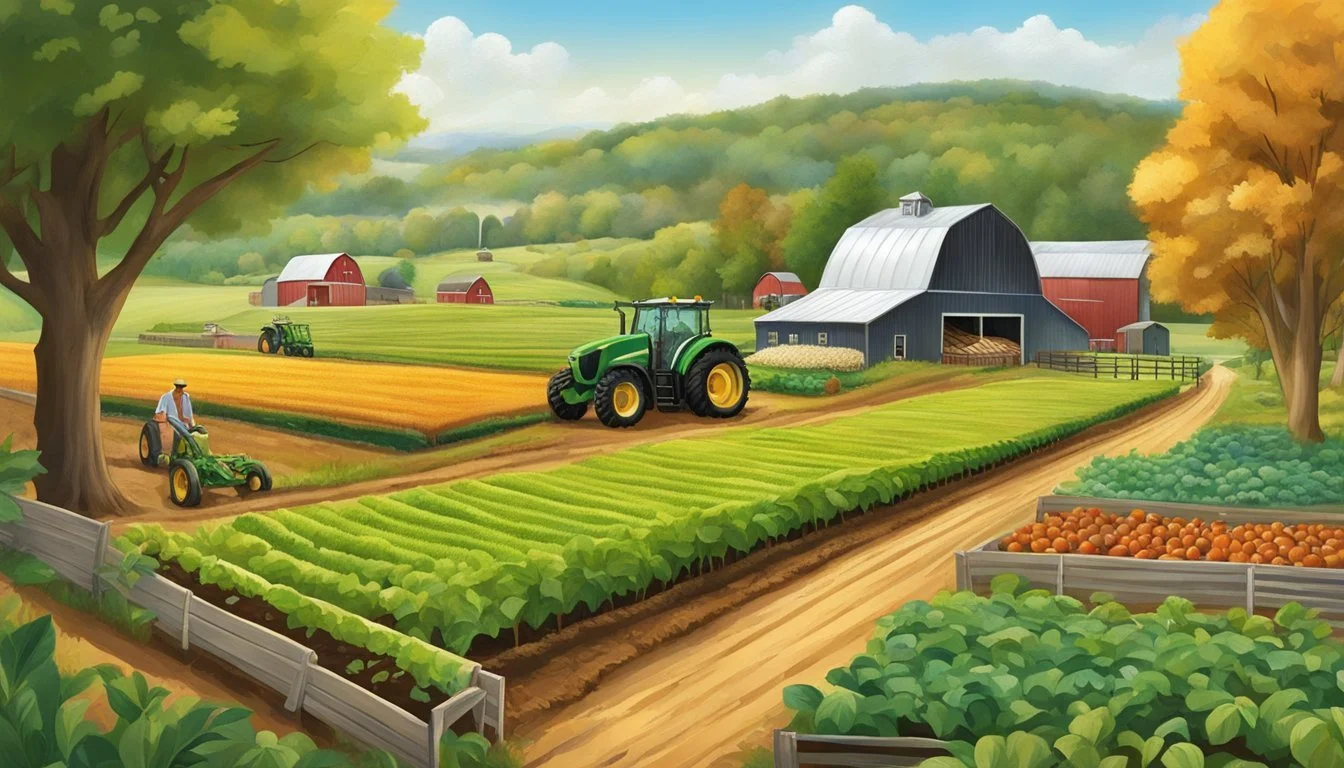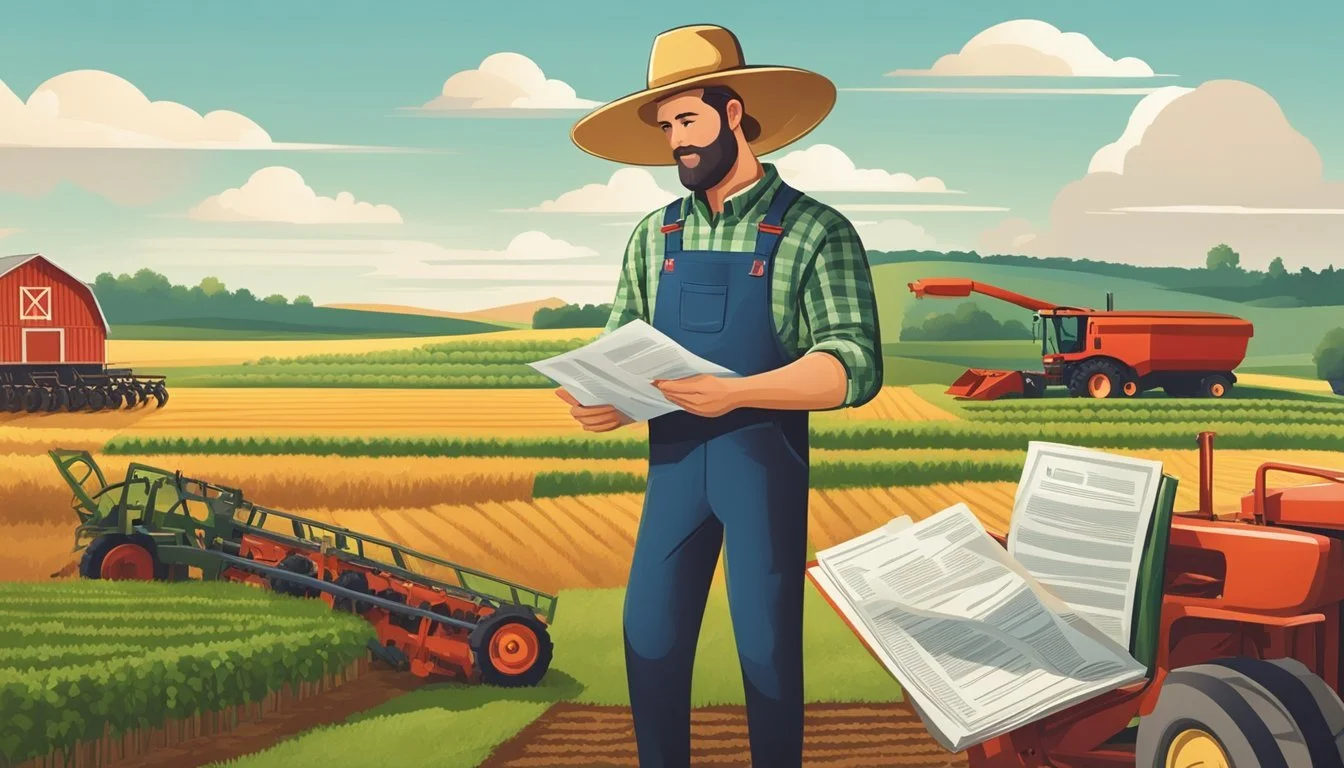Guide to Farming in Tennessee
Essential Tips for Successful Agriculture
This Article is Part of Our State by State Farming Guide
Tennessee’s agricultural landscape is as varied and rich as its history. With over 69,500 farms covering approximately 39.6% of the state’s land, farming is not only a way of life for many Tennesseans but also a critical component of the state's economy. The Volunteer State's farms are, on average, 154 acres, demonstrating a balance between larger operations and the small family-owned farms that characterize much of Tennessee's rural charm. The state is known for a diverse range of agricultural offerings, from traditional row crops to livestock and advanced agroforestry practices.
The economic impact of agriculture in Tennessee cannot be overstated, contributing around $89 billion to the state's economy. This includes a mix of livestock, dairy, poultry, fish, fruit, and truck farms. With an infrastructure that supports farming, including resources like the Tennessee Agricultural Enhancement Program and initiatives such as Pick Tennessee Products, the state not only fosters local farming efforts but also encourages the connectivity between producers and consumers.
For those looking to embark on a farming venture, Tennessee provides a supportive backdrop with numerous resources aimed at beginning farmers. Extension services and educational opportunities abound, offering guidance and support to those navigating the complexities of starting and managing a farm. Whether an established farmer or someone considering the first steps into agriculture, Tennessee's policies and programs aim to cultivate success and sustainability in farming endeavors.
Understanding Tennessee Agriculture
Tennessee agriculture is diverse and deeply rooted in the state’s history, playing a pivotal role in the economy with a variety of regions specializing in different crops. Farming is integral to the state, with significant contributions including staple crops like corn.
History of Farming in Tennessee
Tennessee's agricultural sector has been a foundational component of the state's development since its early settlement. The state's farming history illustrates an evolution from traditional small-scale family farms to technologically advanced, larger-scale operations. As farm sizes have increased over the years, so has the efficiency and production capability, propelling Tennessee into a leading agricultural state.
Role in Economy
Agriculture is one of the main economic drivers in Tennessee, creating numerous jobs and contributing significantly to the state's revenue. According to the Tennessee Department of Agriculture, the economic impact of farming is substantial, with a reported influence of around $89 billion. It supports thousands of jobs directly related to agriculture as well as auxiliary industries.
Agricultural Regions and Crops
Tennessee's landscape is divided into three grand divisions with distinctive agricultural features: the East, Middle, and West Tennessee.
East Tennessee: Primarily known for its livestock and forestry products.
Middle Tennessee: A mixed farming area with livestock, tobacco, corn, and soybeans. (how long do soybeans last?)
West Tennessee: Recognized for its row-crop agriculture with a predominance of cotton, soybeans, and corn production.
The geography and climate across these regions determine the crop viability and agricultural practices. Farms in Tennessee average around 154 acres in size, and the state is home to thousands of farms cultivating a variety of crops with corn being one of the top commodities.
Top Commodities in Tennessee Soybeans Corn Wheat Cotton Hay Tobacco Cattle & Calves Broiler Chickens Fresh-market Tomatoes Dairy Products
With a rich agricultural history and its strong current economic role, Tennessee continues to focus on a sustainable and fruitful farming future, adapting practices to the current demands and technological advancements.
Getting Started with Farming
For individuals aspiring to embark on agriculture in Tennessee, the initial steps involve gaining knowledge, securing land, and meticulously planning farm operations. These elements lay the groundwork for a successful entry into the farming industry.
Beginning Farmer Programs
Tennessee supports aspiring farmers through a variety of Beginning Farmer Programs. The Tennessee State Government provides resources and guidance to help newcomers formulate their farming plans. Key programs include educational opportunities through the UT Extension, which offers a wealth of knowledge on agricultural practices and business management. The USDA also recognizes anyone operating a farm with the intent of profit for less than ten years as a beginning farmer or rancher, and they offer dedicated assistance to these individuals.
Land Acquisition and Management
When it comes to Land Acquisition and Management, securing appropriate farmland is critical. Prospective farmers must consider not only the purchase or lease of land but also the sustainability and suitability of land for their chosen agricultural endeavors. The management aspect involves soil health, water access, and zoning regulations, which are essential factors in establishing a farm.
Farm Planning and Operations
Farm Planning and Operations demand strategic development and effective management. Creating a robust business plan is a foremost step which includes setting clear objectives, identifying market opportunities, and detailing financial projections. The Internal Revenue Service defines a farm as an entity that cultivates, operates, or manages for profit, encompassing various types of farms such as livestock, dairy, poultry, and fruit. Ensuring operations are geared toward profitability is fundamental, and this includes making informed decisions about crop and livestock selections, understanding the supply chain, and implementing modern farming practices.
Key Agricultural Programs
Tennessee offers several key agricultural programs aimed at supporting the state's farming initiatives. These programs are essential for enhancing farm productivity, providing financial assistance, and driving innovation in Tennessee’s agricultural sector.
Tennessee Agricultural Enhancement Program (TAEP)
The Tennessee Department of Agriculture administers the TAEP, which provides cost-share assistance for Tennessee's agricultural community. This program's main goal is to invest in farm infrastructure improvements and promote environmental stewardship.
Cost-share categories include:
Livestock Equipment
Genetics
Hay Storage
Grain Storage
This initiative is crucial for farmers looking to improve production capabilities and implement more efficient agricultural practices.
Farm Bureau Services
The Tennessee Farm Bureau provides a variety of services to support local farmers. Membership in the Bureau grants access to these resources, which include:
Education and advocacy programs to empower farmers with the knowledge necessary to manage their businesses effectively.
Insurance and financial services tailored to the unique needs of farmers, including crop insurance and farm estate planning.
The availability of these services ensures that farmers in Tennessee have the resources needed to navigate the complexities of agricultural business.
UTK Seed Library Initiative
The UTK Seed Library Initiative is a program launched by the University of Tennessee, Knoxville, which aims to serve agricultural communities by preserving seed varieties and promoting biodiversity. They provide:
Access to a diverse catalog of seeds.
Resources for education and workshops on sustainable agriculture.
This initiative is pivotal for safeguarding genetic diversity and supporting local food systems through community engagement and education.
Each of these programs contributes to the strength and resilience of Tennessee's agricultural sector, helping farmers to achieve success in their endeavors.
Market Opportunities in Agriculture
Tennessee's agricultural sector offers a wealth of market opportunities, including direct sales, agritourism, and initiatives to expand food access. Each pathway provides distinct advantages for farmers looking to diversify and strengthen their business model.
Direct Sales and 'Pick Tennessee Products'
Farmers in Tennessee have the advantage of participating in the "Pick Tennessee Products" campaign. This initiative connects consumers with locally grown produce, encouraging direct sales. Direct sales channels include farmers’ markets, community-supported agriculture (CSA) programs, online marketplaces, and roadside stands. By adopting these sales methods, farmers reduce intermediaries, potentially increasing profit margins.
Agritourism and Educational Opportunities
Agritourism is a growing segment that combines agriculture and tourism to create a visitor-friendly farm experience. Tennessee farmers have expanded their operations to include hayrides, corn mazes, U-pick fields, and farm tours. These activities not only generate additional revenue but also offer educational opportunities for the public to learn about farming and food production.
Expanding Food Access
The state of Tennessee is working on expanding food access to underserved communities. Programs like the FARM cost share program aim to strengthen the food supply chain, ensuring all communities have access to fresh, local produce. By participating in these initiatives, farmers contribute to a more equitable food system and can reach a broader customer base.
Sustainable Farming Practices
In Tennessee, sustainable farming practices focus on environmental stewardship, economic viability, and maintaining a balance with the local ecosystem. Emphasis is placed on methods that support a healthy environment and promote conservation.
Conservation and Forestry
Within Tennessee's diverse landscape, conservation and forestry are integral to sustainable agriculture. Farmers implement strategies like cover cropping to prevent soil erosion, improve water quality, and enhance biodiversity. Forest management practices are geared towards maintaining woodland health, which not only supports wildlife but also provides economic benefits from timber and non-timber forest products.
Organic Certification and Farms
Organic certification in Tennessee is a process that guarantees farms adhere to predefined sustainability criteria. This includes the prohibition of most synthetic pesticides and fertilizers, as well as ensuring healthy living conditions for livestock. Certified organic farms often experience an increase in profit due to consumer demand for organic produce, indicating a linkage between sustainable farming and viable economic strategies.
Innovations in Sustainable Agriculture
They are constantly exploring innovations in sustainable agriculture to better integrate farming practices with the surrounding ecosystem. This includes:
Regenerative Agriculture: A systems-based approach that views agriculture as a part of the larger ecosystem. It focuses on soil health and plant diversity to restore land.
Agri-technology: The development and adoption of technologies that enhance sustainable production, such as precision farming tools that optimize resource use and reduce waste.
Legal and Financial Considerations
In the context of farming in Tennessee, it's important for potential and existing farmers to familiarize themselves with the specific legalities and financial aspects relevant to the agriculture industry. Adherence to regulations ensures compliance, while knowledge of financial opportunities and risks can greatly affect the economic sustainability of a farm.
Understanding Farm Regulation
Regulations in Tennessee's agricultural sector are designed to protect both the farmer and the broader environment. Farmers must check with local zoning laws to understand land use restrictions. Each piece of land will have designated uses, and farmers are required to confirm that their intended activities comply with these:
Zoning classifications: Determine what the land is zoned for—agriculture, commercial, residential, etc.
Permit requirements: Secure necessary agricultural permits before starting operation.
Farm Finance and Taxation
The financial health of any farm is contingent upon effective management of resources and understanding of taxation. Tennessee offers a variety of financial resources for farmers:
Grants and funding: Opportunities such as those provided by the Agriculture Act of 2014.
Agricultural tax considerations: Tax implications of farming operations which may include, but are not limited to, sales tax exemptions, property tax assessments, and income tax provisions unique to agricultural practices.
Risk Management and Insurance
Risk is inherent in farming given the variables of weather, market demand, and crop productivity. Farmers must employ risk management strategies and maintain suitable insurance coverage.
Insurance types:
Crop insurance: Protects against the loss of crops due to natural disasters.
Liability insurance: Covers against potential legal issues.
Risk strategies:
Diversification of crops
Technological investments that enhance sustainability and reduce exposure to adverse weather conditions.
Comprehensive understanding and proactive management of these Considerations are pivotal for the operational success and financial resilience of Tennessee farms.
Community and Education
Tennessee's farming community is bolstered by educational programs focusing on agricultural expertise, student involvement, and sustainable practices. These initiatives are designed to empower individuals with knowledge and practical experience, fostering a robust network that supports the state's agricultural well-being.
University of Tennessee Knoxville Programs
The University of Tennessee Knoxville (UTK) extends a variety of programs aimed at agricultural education. The mission of these programs is to equip students with in-depth knowledge of farming practices and to prepare them to contribute effectively to the farming industry of Tennessee. UTK programs place a strong emphasis on both theoretical knowledge and practical skills necessary for today's agricultural challenges.
Experiential Learning and Student Engagement
Experiential learning is a key component of UTK's agricultural curriculum. Students engage in hands-on activities, from farm management to scientific research, to enhance their learning experience. This direct engagement helps students to connect theoretical knowledge with real-world applications, a process which is instrumental in preparing them for future careers in agriculture.
Promoting Healthy and Sustainable Lifestyles
UTK is committed to promoting sustainable farming practices that contribute to healthy lifestyles. Through community connections, the institution advocates for strategies that protect the environment while also supporting local economies. Their educational programs inspire not only students but also the wider community, encouraging everyone to adopt practices that lead to a more sustainable and health-conscious way of living.
Advancing Tennessee Agriculture
Tennessee's agriculture sector is embracing forward-thinking strategies, focusing on research, development, and innovation. These efforts empower students and engage with global agricultural trends, ensuring that the sector's growth aligns with the core values of knowledge enhancement and sustainable practices.
Research and Development
In Tennessee, the Tennessee Department of Agriculture and the University of Tennessee Extension are key players in agricultural research and development. They provide valuable resources and support for agroforestry, helping farmers integrate trees and shrubs into their farming systems. This collaboration is essential for the optimization of agricultural practices and the stewardship of environmental resources.
Empowering Innovation Among Students
The future of agriculture in Tennessee is being shaped by the new generation of farmers. Programs focused on empowering students are critical to this transformation. Initiatives such as farm-to-table movements have made agriculture a compelling field of study and practice, especially for Black students, who are increasingly drawn to agricultural sciences. Social media serves as a catalyst, spotlighting agricultural opportunities and successes, thus inspiring a broader demographic to consider careers in this sector.
Engagement With Global Agricultural Frontiers
Tennessee farmers and agricultural professionals are not just limited to local or national markets. They are actively engaging with global agricultural frontiers, exploring how international trends can inform and improve local practices. Such engagement contributes to the frontiers of human knowledge in agriculture and resonates with the free enterprise and private property rights ethos prevalent in the state.









